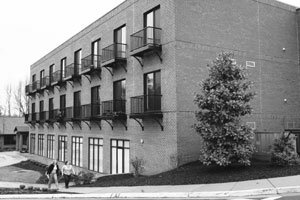NEWS- Edifice complex? Councilor questions Region Ten
Published December 1, 2005, in issue 0448 of The Hook
BY LISA PROVENCE
As the key public mental health services provider in Central Virginia, Region Ten owns a number of properties where it houses clients, including a complex on Little High Street that sparked a neighborhood outcry in September.
Its most recent purchase, the Portico Apartments at 500 Old Lynchburg Road, threatens to raise the controversy quotient as the government-funded agency spent nearly $6 million for a nine-acre "campus" anchored by luxury apartments.
"I think it's very odd in this situation," says City Councilor Blake Caravati. "It worries me that the debt burden they've incurred could affect their function. Region Ten is not a business. They're not entrepreneurs."
Caravati might be forgiven for casting a wary eye on the use of public money to dabble in real estate. Charlottesville residents with long memories might recall that the Omni deal cooked up by City Council in 1985 ended up costing taxpayers $11 million.
But the director of Region Ten rejects such comparisons.
"The board saw it as an investment-- not for profit-making but for stabilizing services and giving Region Ten a home," counters director Philip Campbell. The campus would not house the mentally ill, mentally retarded, or substance abusers-- just administrative offices. The agency would continue to rent out the 41 Soho-inspired executive apartments.
Portico Apartments were once Mountain Wood, an alcohol treatment facility. The property served a stint as Covenant School before previous owner Jim Stultz created the loft apartments.
To Region Ten's Campbell, the deal makes sense for an agency with facilities spread over several counties, allowing consolidation of functions into 9,400 square feet.
The building will provide a stream of revenue not tied to the fluctuating fee-for-service rates the state pays, Campbell explains. "We currently spend a lot of taxpayer dollars renting space," he says.
But after the brouhaha in his neighborhood, Caravati says he finds the deal "unseemly." Caravati is still bristling at the accusation-- even if merely implied-- that the Little High Street neighborhood opposition was based on bigotry.
"They've used the argument 'Y'all really don't want the mentally ill and the mentally retarded living near you. But we're going to put our corporate campus near 40 high-market apartments,'" Caravati says.
Charlottesville landlords are currently experiencing a supply glut that has pushed rents down and prompted conversion of several apartment complexes to condos. And Caravati points out that 600 other rental units down the road from Portico Apartments have high vacancy rates.
"They have no expertise in doing this," he says.
The city of Charlottesville gives Region Ten $750,000 a year, according to Caravati.
"By buying this," says Caravati, "they're undoubtedly creating more financial load. Are they going to pass it on to their programs? Are they going to come back to us for more money? We didn't make the decision for them to buy a nice corporate campus. I'd prefer for them to stay in town."
Campbell contends the move is good planning to stabilize the cost of rent. And he says Region Ten has hired a management firm to handle the apartments. As for the commercial side, "We'd had landlord-like experience," he says. "We're set up to do that from 800 Preston," the former Bank of America location that Region Ten owns and will continue to own, according to Campbell.
The $5,875,700 sale offered a tax break for seller Stultz. The Old Lynchburg Road property was appraised for $10 million, and the $4.124 million difference counts as a charitable gift.
Such donations don't happen very often, but they're "not terribly unusual," according to attorney Fred Payne. He cites John Kluge's multi-million-dollar gift of real estate to UVA.
The key is having a nonprofit willing to buy it and a seller who can afford to make the donation.
"It's certainly a recognized way to do it as far as the IRS is concerned," says Payne, whose firm assisted the transaction. "It's certainly not some fly-by-night thing that [disgraced California Congressman] Duke Cunningham would do."
However, county assessor Bruce Woodzell-- while not disputing the transaction-- seems a little perplexed by the value affixed to a property his office had assessed for just $4.97 million.
"I worked it on income, and I couldn't come up with $10 million," he says.
Complex properties often garner multiple appraisals, says Ivo Romenesko of the Appraisal Group, which was not involved in the transaction. "There's nothing wrong with using the value most beneficial to you," says Romenesko, "as long as it's competently done."
Seller Jim Stultz says the apartments are fully leased and a realtor set up the deal. His $4 million gift, he says, was "something we wanted to do for the community."
And Region Ten's decision to buy the property came as no surprise to Stultz. "Once you understand all they do, it makes sense someone had the foresight to put all these things in one place," he says.

Region Ten's newest property will not house its clients.
PHOTO BY BILLY HUNT
#
|